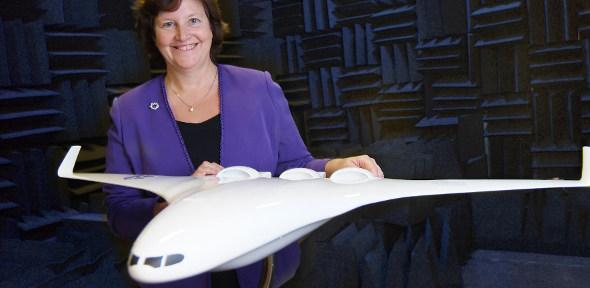
The Times newspaper has named 12 Cambridge academics in their inaugural list of the 100 most important contemporary figures in British science. The first ranking of contemporary figures in British science was released today in Eureka, The Times’ monthly science magazine.
Professor Dame Ann Dowling Head of Engineering is included in the list. As the UK lead for the recent 'Silent Aircraft' initiative, Ann aimed to develop a conceptual design for an aircraft whose noise would be almost imperceptible outside the perimeter of a daytime urban airport. She is a Fellow of Sidney Sussex College.
Also from the Department of Engineering is Professor Mark Welland Director of The Nanoscience Centre. His research encompasses a number of aspects of nanotechnology ranging from sensors for medical applications to understanding and controlling the properties of nanoscale structures and devices. He is also Chief Scientific Adviser at the Ministry of Defence.
The list includes the following Cambridge academics from other Departments:
Stephen Hawking is the Director of Research at the Department of Applied Mathematics and Theoretical Physics, Emeritus Lucasian Professor of Mathematics at the University as well as a Fellow of Gonville and Caius College. Hawking is best known for his pioneering research into black holes, thermodynamics and unifying Einstein's general relativity theory with quantum theory, as well as his book A Brief History of Time.
Sir Richard Friend, Cavendish Professor of Physics and Fellow of St John's College, has revolutionised our understanding of carbon-based semiconductors. His research helps to develop flat panel displays, and flexible screens that can be rolled up and transported.
David Mackay is Professor of Natural Philosophy at the Cavendish. He is the creator of Dasher, a machine-learning system that allows users to navigate using any muscular movement, their breath or gaze, and write using a continually unfurling alphabetical display. He is also currently Chief Scientific Advisor at the Department of Energy and Climate Change.
Sir David Baulcombe holds the Regius Professorship of Botany at the University of Cambridge. Sir David discovered how small molecules of ribonucleic acid (RNA) govern gene activity through a process known as RNA silencing. Professor Baulcombe's research has unravelled how this mechanism is important in gene regulation and in disease resistance. He is a Fellow of Trinity College.
Sir Greg Winter is a Fellow of Trinity College and Deputy Director of the MRC's Centre for Protein Engineering. He is known for his pioneering work on therapeutic monoclonal antibodies.
Professor Sir Leszek Borysiewicz is the new Vice-Chancellor of the University of Cambridge. He was Chief Executive of the UK's Medical Research Council from 2007 to last month, and from 2001 to 2007 was at Imperial College London, where he served as Principal of the Faculty of Medicine and later as Deputy Rector.
Professor Steve Ley is BP Professor of Organic Chemistry at the Department of Chemistry and a Fellow of Trinity College. His research focuses on developing new synthesis methods and applying them to the construction of biologically important molecules.
George Efstathiou is Professor of Astrophysics and Director of the Kavli Institute of Cosmology. Professor Efstathiou and his team provided some of the first evidence that dark energy exists. He is a Fellow of King's College.
Steve O'Rahilly is Professor of Clinical Biochemistry and Medicine and Co-Director of the Institute of Metabolic Science. His research focuses on the links between genetics and obesity.
Shankar Balasubramanian, Herchel Smith Professor of Medicinal Chemistry at the Department of Chemistry, developed (along with Professor David Klenerman) low-cost, high throughput sequencing that enables researchers to undertake large-scale projects. In 1998 they founded the spin-out company Solexa (which was later purchased by Illumina) to commercialise their inventions.

